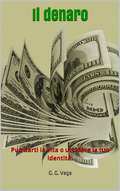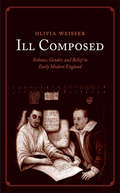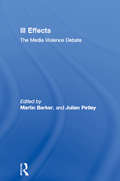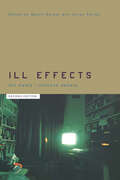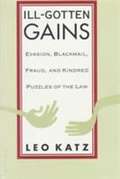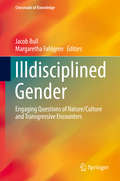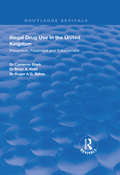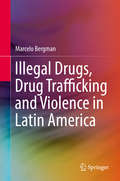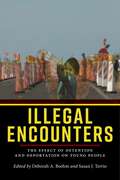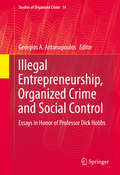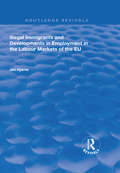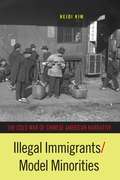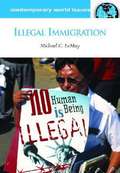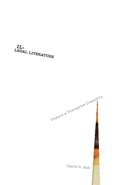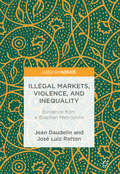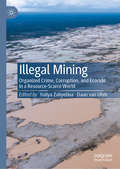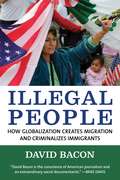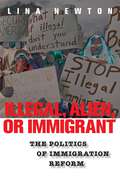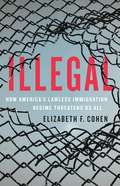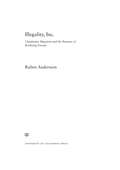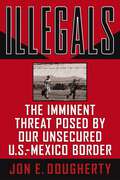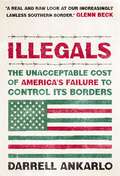- Table View
- List View
Il denaro
by Guido Galeano Vega Stefano VazzolaIn questo libro voglio condividere il mio punto di vista sul denaro. Vi sono molti punti di vista, in special modo una cattiva interpretazione biblica da parte di molte persone che demonizzano il denaro. Leggendo questo libro capirai perché nella Bibbia ci sono avvertimenti sul pericolo sociale rappresentato dal denaro. Il mondo e la vita di ciascun individuo gravitano necessariamente attorno al denaro; da qui l'importanza di capirlo un po' meglio e di dargli il giusto valore, in modo che, usando il senso comune e l'intelligenza del denaro, diventi uno strumento positivo nella vita delle persone e in tutta la società umana.
Il valore di una donna
by Guido Galeano Vega Stefano VazzolaPurtroppo la storia dell'umanità post diluvio (Genesi 6 e 7) ci rivela che le donne hanno sofferto molto, soprattutto a causa dell'abuso da parte degli uomini, della mancanza di rispetto e della mancanza di valorizzazione dell'identità della donna. Hanno patito ridicole limitazioni sociali, intellettuali e lavorative, scorrettezze di ogni tipo, disprezzo, discriminazione ed emarginazione. A un certo punto gli uomini commisero l'ingiustizia di chiamarle sesso debole, di solito con un'accezione di disprezzo, di inutilità o di molestia. La cosa ironica è che ogni uomo, dopo Adamo, esiste grazie a una donna. Senza il ventre della donna non potrebbero venire partoriti; senza i seni della donna non resisterebbero una settimana, e senza la protezione, l'aiuto e la cura e l'educazione delle rispettive madri non diventerebbero uomini utili, non potrebbero diventare forti né sentirsi in grado di gestire la loro indipendenza. Quest'opera mira a porre le donne sul piedistallo che meritano. Noi uomini non siamo migliori, abbiamo solo altri ruoli nella vita.
Ill Composed
by Olivia WeisserIn the first in-depth study of how gender determined perceptions and experiences of illness in seventeenth- and eighteenth-century England, Olivia Weisser invites readers into the lives and imaginations of ordinary men and women. Drawing on a wide range of sources, including personal diaries, medical texts, and devotional literature, the author enters the sickrooms of a diverse sampling of early modern Britons. The resulting stories of sickness reveal how men and women of the era viewed and managed their health both similarly and differently, as well as the ways prevailing religious practices, medical knowledge, writing conventions, and everyday life created and supported those varying perceptions. A unique cultural history of illness, Weisser's groundbreaking study bridges the fields of patient history and gender history. Based on the detailed examination of over fifty firsthand accounts, this fascinating volume offers unprecedented insight into what it was like to live, suffer, and inhabit a body more than three centuries ago.
Ill Effects: The Media Violence Debate (Communication and Society)
by Julian Petley Martin BarkerIll Effects is a radical re-examination of the whole 'media effects' debate. It questions not only whether the media is capable of directly influencing people's views and actions, but also whether the idea of 'effects' is the most useful way of conceptualising the relationship between the media and audiences. Ill Effects looks at the reasons why the media are routinely blamed for horrific events such as the murders of James Bulger and Suzanne Capper and the Hungerford massacre, as well as for perceived trends such as the alleged 'death of the family' and the rise of 'yob culture'. The authors' concern goes beyond individual cases: they discuss the development and current state of play of research into media effects, the remarkable power of 'common-sense' notions of media effects and the way in which the effects issue has become embroiled in debates about freedom of expression and censorship. They suggest how audiences really respond to media texts, and argue that there is an urgent need for informed and interdisciplinary approaches to the study of the media. Martin Barker, University of the West of England, UK Julian Petley, Brunel University,UK Pat Holland, David Buckingham, The Anneberg School for Communication,UK David Mi
Ill Effects: The Media Violence Debate (Communication and Society)
by Julian Petley Martin BarkerThe influence of the media remains a contentious issue. Every time a particularly high-profile crime of violence is committed, there are those who blame the effects of the media. The familiar culprits of cinema, television, video and rock music, have now been joined, particularly in the wake of the massacre at Columbine High, by the Internet and the World Wide Web. Yet, any real evidence that the media do actually have such negative effects remains as elusive as ever and, consequently, the debate about effects frequently ends up as being little more than strident and rhetorical appeals to 'common sense'. Ill Effects argues that the question of media influence needs to be debated by those with a clearer understanding of how audiences and media interact with one another. Analysing the failure of the effects approach to understand both the modern media and their audiences, this second edition examines the influence of the effects tradition in America, the United Kingdom, Australia and Europe as well as the role of the British Board of Film Classification. Contributors examine the increasing number of stories about the alleged ill effects of the Internet and enquire whether this is a prelude to, and a crude attempt to legitimise, the imposition of tighter controls on new media. Ill Effects is a guide for the perplexed. It suggests new and productive ways in which we can understand the effects of the media and questions why many in media education accept a simple interpretation of the effects debate, particularly at times of moral panic. Refusing to adopt the absurd position that the media have no influence at all, Ill Effects reconceptualises the notion of media influence in ways which take into account how people actually use and interact with the media in their everyday lives. Martin Barker, Sara Bragg, David Buckingham, Tom Craig, David Gauntlett, Patricia Holland, Annette Hill, Mark Kermode, Graham Murdoch, Julian Petley, Sue Turnbull.
Ill-Equipped
by Human Rights Watch StaffMentally ill offenders face mistreatment and neglect in many U.S. prisons. One in six U.S. prisoners is mentally ill. Many of them suffer from serious illnesses such as schizophrenia, bipolar disorder, and major depression. There are three times as many men and women with mental illness in U.S. prisons as in mental health hospitals. The rate of mental illness in the prison population is three times higher than in the general population. This 215-page report examines how prisons are dangerous and damaging places for mentally ill people. Other prisoners victimize and exploit them. Prison staff often punish mentally ill offenders for symptoms of their illness - such as being noisy or refusing orders, or even self-mutilation and attempted suicide. Mentally ill prisoners are more likely than others to end up housed in especially harsh conditions, such as isolation, that can push them over the edge into acute psychosis. Woefully deficient mental health services in many prisons leave prisoners undertreated - or not treated at all. Across the country, prisoners cannot get appropriate care because of a shortage of qualified staff, lack of facilities, and prison rules that interfere with treatment. The report is based on more than two years of research and hundreds of interviews with prisoners, corrections officials, mental health experts and attorneys and makes recommendations on services and regulations that would assist and protect mentally ill prisoners.
Ill-Gotten Gains: Evasion, Blackmail, Fraud, and Kindred Puzzles of the Law
by Leo KatzLeo Katz describes the underlying principles that not only guide the law but also moral decisions. Mixing wit with insight, anecdotes with analysis, Katz uncovers what is really at stake in crimes such as insider trading, blackmail, and plagiarism.
Illdisciplined Gender
by Jacob Bull Margaretha FahlgrenThis volume offers some of the outputs, challenges and opportunities created in an interdisciplinary programme that was set up to engage multi-, inter- and transdisciplinary perspectives on issues at the intersections of nature and culture, sex and gender. When working with mass spectrometers, microscopes, discourse analysis or interviews, one rarely has to explain them to colleagues. They are the tools used. But when working in inter- or transdisciplinary settings, such tools require explanations. These conversations make evident that trans and interdisciplinary (gender) research is a not just a novelty requiring an adjectival prefix 'trans-' or 'inter-', it is something done, performed, practiced. Moreover it is something done in particular spaces, a consequence of particular meetings - transgressive encounters. This collection is built on work conducted under the GenNa: Nature/Culture and Transgressive Encounters Research Programme, funded by the Swedish research council. It brings together a range of scholars from the humanities, natural, physical, life, and social sciences by so doing it reflects on the challenges, risks and opportunities of doing trans- and interdisciplinary work. The result is a collection that uses a multitude of tools to examine issues such as sexual difference, hydro power exploitation, research seminars, dairy farming, the spaces between molecules, film and identity. They are witness to the diversity created through transgressive encounters and illustrations of doing inter- and transdisciplinary research.
Illegal Drug Use in the United Kingdom: Prevention, Treatment and Enforcement (Routledge Revivals)
by Cameron Stark Brian A. Kidd Roger A.D. SykesFirst published in 1999, Illegal Drug Use in the United Kingdom provides a comprehensive review of information and interventions available in drug misuse in order to inform local drug policies. In keeping with the policy documents in both Scotland and England, the volume covers the breadth of possible interventions, rather than health care alone. Separate chapters review educational, policing and counselling approaches and discuss work with special groups such as rural drug users, sex workers and club-goers. Although there are specialist textbooks on all aspects of addiction, this is the first text-book to bring together information in the framework used in the policy documents in the UK.
Illegal Drugs, Drug Trafficking and Violence in Latin America
by Marcelo BergmanThis book describes the main patterns and trends of drug trafficking in Latin America and analyzes its political, economic and social effects on several countries over the last twenty years. Its aim is to provide readers an introductory yet elaborate text on the illegal drug problem in the region. It first seeks to define and measure the problem, and then discusses some of the implications that the growth of production, trafficking, and consumption of illegal drugs had in the economies, in the social fabrics, and in the domestic and international policies of Latin American countries. This book analyzes the illegal drugs problem from a Latin American perspective. Although there is a large literature and research on drug use and trade in the USA, Canada, Europe and the Far East, little is understood on the impact of narcotics in countries that have supplied a large share of the drugs used worldwide. This work explores how routes into Europe and the USA are developed, why the so-called drug cartels exist in the region, what level of profits illegal drugs generate, how such gains are distributed among producers, traffickers, and dealers and how much they make, why violence spread in certain places but not in others, and which alternative policies were taken to address the growing challenges posed by illegal drugs. With a strong empirical foundation based on the best available data, Illegal Drugs, Drug Trafficking and Violence in Latin America explains how rackets in the region built highly profitable enterprises transshipping and smuggling drugs northbound and why the large circulation of drugs also produced the emergence of vibrant domestic markets, which doubled the number of drug users in the region the last 10 years. It presents the best available information for 18 countries, and the final two chapters analyze in depth two rather different case studies: Mexico and Argentina.
Illegal Encounters: The Effect of Detention and Deportation on Young People
by Susan J. Terrio Deborah A. BoehmThe impact of the U.S. immigration and legal systems on children and youth In the United States, millions of children are undocumented migrants or have family members who came to the country without authorization. The unique challenges with which these children and youth must cope demand special attention. Illegal Encounters considers illegality, deportability, and deportation in the lives of young people—those who migrate as well as those who are affected by the migration of others. A primary focus of the volume is to understand how children and youth encounter, move through, or are outside of a range of legal processes, including border enforcement, immigration detention, federal custody, courts, and state processes of categorization. Even if young people do not directly interact with state immigration systems—because they are U.S. citizens or have avoided detention—they are nonetheless deeply affected by the reach of the government in its many forms.Contributors privilege the voices and everyday experiences of immigrant children and youth themselves. By combining different perspectives from advocates, service providers, attorneys, researchers, and young immigrants, the volume presents rich accounts that can contribute to informed debates and policy reforms. Illegal Encounters sheds light on the unique ways in which policies, laws, and legal categories shape so much of daily life for young immigrants. The book makes visible the burdens, hopes, and potential of a population of young people and their families who have been largely hidden from public view and are currently under siege, following their movement through complicated immigration systems and institutions in the United States.
Illegal Entrepreneurship, Organized Crime and Social Control
by Georgios A. AntonopoulosThis book covers organized crime groups, empirical studies of organized crime, criminal finances and money laundering, and crime prevention, gathering some of the most authoritative and well-known scholars in the field. The contributions to this book are new chapters written in honor of Professor Dick Hobbs, on the occasion of his retirement. They reflect his powerful influence on the study of organized crime, offering a novel perspective that located organized crime in its socio-economic context, studied through prolonged ethnographic engagement. Professor Hobbs has influenced a generation of criminology researchers engaged in studying organized crime groups, and this work provides a both a look back and this influence and directions for future research. It will be of interest to researchers in criminology and criminal justice, particularly with a focus on organized crime and financial crime, as well as those interested in corruption, crime prevention, and applications of ethnographic methods.
Illegal Immigrants and Developments in Employment in the Labour Markets of the EU
by Jan HjarnøThis title was first published in 2003. The problem of illegal labour immigration is one of the most controversial and hotly debated issues to confront the EU. This book examines the Scandinavian model of social partnership by which labour market relations are governed, creating an effective barrier to the employment of illegal immigrants. Using Denmark, Portugal and Germany as case studies it questions the impact of illegal immigrants and whether they pose a serious threat to the free movement of labour, capital and commodities. It will prove invaluable to those interested in labour market relations throughout the world.
Illegal Immigrants/Model Minorities: The Cold War of Chinese American Narrative (Asian American History & Cultu #225)
by Heidi KimIn the Cold War era, Chinese Americans were caught in a double-bind. The widespread stigma of illegal immigration, as it was often called, was most easily countered with the model minority, assimilating and forming nuclear families, but that in turn led to further stereotypes. In Illegal Immigrants/Model Minorities, Heidi Kim investigates how Chinese American writers navigated a strategy to normalize and justify the Chinese presence during a time when fears of Communism ran high. Kim explores how writers like Maxine Hong Kingston, Jade Snow Wong, and C. Y. Lee, among others, addressed issues of history, family, blood purity, and law through then-groundbreaking novels and memoirs. Illegal Immigrants/Model Minorities also uses legal cases, immigration documents, and law as well as mass media coverage to illustrate how writers constructed stories in relation to the political structures that allowed or disallowed their presence, their citizenship, and their blended identity. Kim illuminates the rapidly shifting political and social pressures on Chinese American authors who selectively concealed, revealed, and reconstructed issues of citizenship, belonging, and inclusion in their writing.
Illegal Immigrants/Model Minorities: The Cold War of Chinese American Narrative (Asian American History & Cultu #225)
by Heidi KimIn the Cold War era, Chinese Americans were caught in a double-bind. The widespread stigma of illegal immigration, as it was often called, was most easily countered with the model minority, assimilating and forming nuclear families, but that in turn led to further stereotypes. In Illegal Immigrants/Model Minorities, Heidi Kim investigates how Chinese American writers navigated a strategy to normalize and justify the Chinese presence during a time when fears of Communism ran high. Kim explores how writers like Maxine Hong Kingston, Jade Snow Wong, and C. Y. Lee, among others, addressed issues of history, family, blood purity, and law through then-groundbreaking novels and memoirs. Illegal Immigrants/Model Minorities also uses legal cases, immigration documents, and law as well as mass media coverage to illustrate how writers constructed stories in relation to the political structures that allowed or disallowed their presence, their citizenship, and their blended identity. Kim illuminates the rapidly shifting political and social pressures on Chinese American authors who selectively concealed, revealed, and reconstructed issues of citizenship, belonging, and inclusion in their writing.
Illegal Immigration
by Mildred Vasan Michael LemayThis book examines the flow of unauthorized immigration to the US, primarily since 1970, and the reactions in and consequences of legal immigration policy. LeMay (political science, social and behavioral sciences, California State University--San Bernardino, emeritus) ultimately takes his discussion of immigration into the context of globalization. The volume includes a chronology, directory of organizations involved in immigration policy-making, a list of resources, and biographical sketches of the major players in illegal immigration policy matters.
Illegal Literature: Toward a Disruptive Creativity
by David S. RohWhat is the cultural value of illegal works that violate the copyrights of popular fiction? Why do they persist despite clear and stringent intellectual property laws? Drawing on the disciplines of new media, law, and literary studies, Illegal Literature suggests that extralegal works such as fan fiction are critical to a system that spurs the evolution of culture.Reconsidering voices relegated to the cultural periphery, David S. Roh shows how infrastructure—in the form of legal policy and network distribution—slows or accelerates the rate of change. He analyzes the relationship between intellectual property rights and American literature in two recent copyright disputes. And, in comparing American fan fiction and Japanese dojinshi, he illustrates how infrastructure and legal climates detract from or encourage fledgling creativity.Illegal Literature fills a crucial gap between the scholarly and the popular by closely examining several modes of marginalized cultural production. Roh makes the case for protecting an environment conducive to literary heresy, the articulation of an accretive rather than solitary authorial genius, and the idea that letting go rather than holding on is important to a generative creative process. In a media ecology inundated by unauthorized materials, Illegal Literature argues that the proliferation of unsanctioned texts may actually benefit literary and cultural development.
Illegal Markets, Violence, and Inequality: Evidence From A Brazilian Metropolis
by Jean Daudelin José Luiz RattonThis book challenges the quasi-consensus that Latin American countries dominate global homicide rankings mainly due to the illegal nature of drug production and trafficking. Building on US scholarship that looks at the role of social exclusion and discriminatory policing in drug violence, the authors of this volume show that the association between illegality and violence cannot be divorced from the inequality that prevails in those countries. This book looks in detail at the functioning of drug markets in Recife, the largest metropolitan area in Brazil’s North-East and, over the last 25 years, the heart of the country’s most violent metropolitan area. Building on extensive interviews and field work, the authors map out the city’s drug markets and explore the reasons why some of those markets are violent, and others are not. The analysis focuses on the micromechanics of each market, looking at consumption patterns and at the workings of retail sales and distribution. Such a systematic micro-level comparative analysis of the workings of Latin American drug markets is simply not available elsewhere in current literature. These findings point to significant gaps in current understandings of the link between illegal markets and violence, and they illuminate the need to factor in the way in which those markets are nested in exclusionary social contexts.
Illegal Mining: Organized Crime, Corruption, and Ecocide in a Resource-Scarce World
by Daan Van Uhm Yuliya ZabyelinaThis book provides a comprehensive analysis of the illegal extraction of metals and minerals from the perspectives of organized crime theory, green criminology, anti-corruption studies, and victimology. It includes contributions that focus on organized crime-related offences, such as drug trafficking and trafficking in persons, extortion, corruption and money laundering and sheds light on the serious environmental harms caused by illegal mining. Based on a wide range of case studies from the Amazon rainforest through the Ukrainian flatlands to the desert-like savanna of Central African Republic and Australia’s elevated plateaus, this book offers a unique insight into the illegal mining business and the complex relationship between organized crime, corruption, and ecocide. This is the first book-length publication on illegal extraction, trafficking in mined commodities, and ecocide associated with mining. It will appeal to scholars working on organized crime and green crime, including criminologists, sociologists, anthropologists, and legal scholars. Practitioners and the general public may welcome this comprehensive and timely publication to contemplate on resource-scarcity, security, and crime in a rapidly changing world.
Illegal People: How Globalization Creates Migration and Criminalizes Immigrants
by David BaconFor two decades veteran photojournalist David Bacon has documented the connections between labor, migration, and the global economy. In Illegal People Bacon explores the human side of globalization, exposing the many ways it uproots people in Latin America and Asia, driving them to migrate. At the same time, U. S. immigration policy makes the labor of those displaced people a crime in the United States. Illegal People explains why our national policy produces even more displacement, more migration, more immigration raids, and a more divided, polarized society. Through interviews and on-the-spot reporting from both impoverished communities abroad and American immigrant workplaces and neighborhoods, Bacon shows how the United States' trade and economic policy abroad, in seeking to create a favorable investment climate for large corporations, creates conditions to displace communities and set migration into motion. Trade policy and immigration are intimately linked, Bacon argues, and are, in fact, elements of a single economic system. In particular, he analyzes NAFTA's corporate tilt as a cause of displacement and migration from Mexico and shows how criminalizing immigrant labor benefits employers. For example, Bacon explains that, pre-NAFTA, Oaxacan corn farmers received subsidies for their crops. State-owned CONASUPO markets turned the corn into tortillas and sold them, along with milk and other basic foodstuffs, at low, subsidized prices in cities. Post-NAFTA, several things happened: the Mexican government was forced to end its subsidies for corn, which meant that farmers couldn't afford to produce it; the CONASUPO system was dissolved; and cheap U. S. corn flooded the Mexican market, driving the price of corn sharply down. Because Oaxacan farming families can't sell enough corn to buy food and supplies, many thousands migrate every year, making the perilous journey over the border into the United States only to be labeled "illegal" and to find that working itself has become, for them, a crime. Bacon powerfully traces the development of illegal status back to slavery and shows the human cost of treating the indispensable labor of millions of migrants-and the migrants themselves-as illegal. Illegal People argues for a sea change in the way we think, debate, and legislate around issues of migration and globalization, making a compelling case for why we need to consider immigration and migration from a globalized human rights perspective.
Illegal, Alien, or Immigrant: The Politics of Immigration Reform
by Lina NewtonWhile the United States cherishes its identity as a nation of immigrants, the country’s immigration policies are historically characterized by cycles of openness and xenophobia. Outbursts of anti-immigrant sentiment among political leaders and in the broader public are fueled by a debate over who is worthy of being considered for full incorporation into the nation, and who is incapable of assimilating and taking on the characteristics and responsibilities associated with being an American. In Illegal, Alien, or Immigrant, Lina Newton carefully dissects the political debates over contemporary immigration reform. Beginning with a close look at the disputes of the 1980s and 1990s, she reveals how a shift in legislator’s portrayals of illegal immigrants—from positive to overwhelmingly negative—facilitated the introduction and passing of controversial reforms. Newton’s analysis reveals how rival descriptions of immigrant groups and the flattering or disparaging myths that surround them define, shape, and can ultimately determine fights over immigration policy. Her pathbreaking findings will shed new light on the current political battles, their likely outcomes, and where to go from here.
Illegal: How America's Lawless Immigration Regime Threatens Us All
by Elizabeth F. CohenA political scientist explains how the American immigration system ran off the rails -- and proposes a bold plan for reform Under the Trump administration, US immigration agencies terrorize the undocumented, target people who are here legally, and even threaten the constitutional rights of American citizens. How did we get to this point? In Illegal, Elizabeth F. Cohen reveals that our current crisis has roots in early twentieth century white nationalist politics, which began to reemerge in the 1980s. Since then, ICE and CBP have acquired bigger budgets and more power than any other law enforcement agency. Now, Trump has unleashed them. If we want to reverse the rising tide of abuse, Cohen argues that we must act quickly to rein in the powers of the current immigration regime and revive saner approaches based on existing law. Going beyond the headlines, Illegal makes clear that if we don't act now all of us, citizen and not, are at risk.
Illegality, Inc.
by Ruben AnderssonIn this groundbreaking ethnography, Ruben Andersson, a gifted anthropologist and journalist, travels along the clandestine migration trail from Senegal and Mali to the Spanish North African enclaves of Ceuta and Melilla. Through the voices of his informants, Andersson explores, viscerally and emphatically, how Europe's increasingly powerful border regime meets and interacts with its target-the clandestine migrant. This vivid, rich work examines the subterranean migration flow from Africa to Europe, and shifts the focus from the "illegal immigrants" themselves to the vast industry built around their movements. This fascinating and accessible book is a must-read for anyone interested in the politics of international migration and the changing texture of global culture.
Illegals: The Imminent Threat Posed by Our Unsecured U.S.-Mexico Border
by Jon DoughertyIn years past, immigration into the United States was treated as a privilege, not a right to be granted automatically just by being able to make it to America's shoreline or borders. Today, however, the entire process of immigration has been drastically politicized by both major parties in Washington, D.C.; one party sees votes - the other, cheap labor. This is investigative journalist Jon Dougherty's probing look into how this indiscriminate immigration is tearing at the fabric of our culture and society. Interviewing Border Patrol agents, local residents, citizen-enforcement groups and even the immigrants themselves, Dougherty examines the implicit dangers of our reckless attitude toward admittance, showing how all American citizens, native-born and otherwise, are consequently threatened by welfare fraud, drug lords, and terrorism. This is the untold, unnerving true story about the social and political turmoil on the U.S.-Mexico border.
Illegals: The Unacceptable Cost of America's Failure to Control Its Borders
by Darrell AnkarloAMERICA'S MELTING POT IS BOILING OVER.Millions of illegals strain an overburdened system. Crime ratesskyrocket. From the Valley of the Sun to the halls of Congress, debate rages. Allthe while, murder and mayhem reign along the U.S.-Mexico border. Speaking intothe fray at a timely juncture, radio talk-show host Darrell Ankarlo delivers agripping, beyond-the-headlines look at illegal immigration: its victims, itsperpetrators, and its toll on the heart of a nation and the will of herlaw-abiding citizens. From the hot-button state of Arizona, Ankarlo daredventure to the epicenter of the battle for America's southern border.Now he dares you to absorb the heartbreaking stories andeye-opening discoveries he brought back from his undercover journey without findingyourself shaken, inspired... and compelled to act.Endorsements:"Instead of complaining about the "border problem," DarrelAnkarlo set out to do something about it--he went there and lived it! InIllegals, Darrell provides a real and raw 'boots on the ground' look at ourincreasingly lawless southern border. This edition . . . will make you shakeyour head and say 'no way' as you're presented with true stories andexperiences about life along the border. This book will enlighten you and attimes frighten you, but in the end you'll know better than most politicianswhat's really happening at the border." --GLENN BECK
